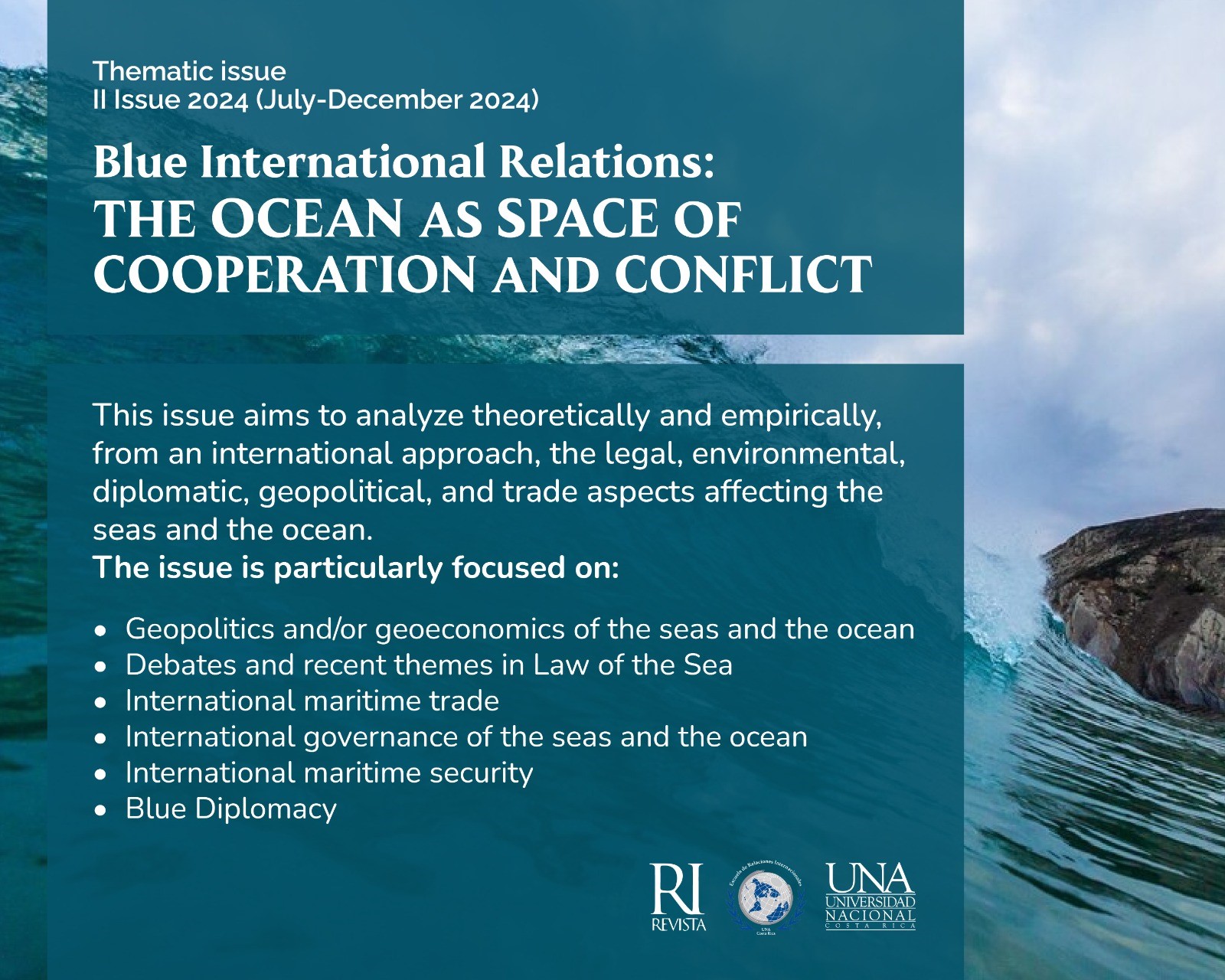Strategic Enhancement and Differential Governance: China’s Partnership Diplomacy in Latin America
DOI:
https://doi.org/10.15359/97-2.3Keywords:
chinese diplomacy, China-Latin America relations, cooperation, governance, Latin America and the Caribbean, partnership, strategic allianceAbstract
This paper studies China’s partnership diplomacy and its practice in Latin America and the Caribbean (LAC). China has constructed an all-round, multi-level, and three-dimensional partnership network in LAC through three stages: strategic exploration, development, and improvement. China has implemented differential governance towards its partners, which enables active shaping and dynamic management of the partnership network. This paper categorizes the 15 partner countries into three types: pivot countries, link countries, and node countries based on their political friendliness with China, geopolitical influence, and potential for economic and trade cooperation. China’s partnerships in LAC are vital support for implementing its diplomatic strategy in the region. However, challenges to this strategy’s development include insufficient mutual support from other diplomatic means, doubts and misinterpretations of the China-Latin America partnership by some Latin American countries, and the political and identity shifts within these countries. To enhance the role of partnerships in maintaining state relations and promoting the implementation of diplomatic strategies, China has introduced new content to its partnership diplomacy in LAC.
References
Biato O. J. (2010). A parceria estratégica sino-brasileira: origens, evolução e perspectivas (1993-2006). Fundação Alexandre de Gusmão.
Borquez A., & Bravo C. (2020). Who are China’s strategic economic partners in South America? Asian Education and Development Studies, 10(3): 445-456. doi: 10.1108/AEDS-09-2019-0153
Cottey A. (2021). The European Union and China: Partnership in Changing Times. The European Union’s Strategic Partnerships: Global Diplomacy in a Contested World, 221-244, doi: 10.1007/978-3-030-66061-1_10
Cui S. J. (2019). 中国和拉美关系转型的特征、动因与挑战 [The Characteristics, Drivers and Challenges of the Transitional Relation of China and Latin America]. Journal of Renmin University of China, 33(03): 95-103 (In Chinese). Available online: http://xuebao.ruc.edu.cn/CN/Y2019/V33/I3/95.
Chen C. K. (2021). China in Latin America then and now: A systemic constructivist analysis of China’s foreign policy. Journal of Current Chinese Affairs, 50(2):111-136. doi: https://doi.org/10.1177/18681026211034880.
Dong Y. B. (2019). On the Conceptual Analysis of the Reasons for and the Attitudes Towards the Academic Circle towards the Establishment of China’s “Partnership Strategy.” Journal of Jiangnan Social University, 21(03): 63-66 (In Chinese). doi: 10.16147/j.cnki.32-1569/c.2019.03.011
Dussel E. P. (2019). China’s Recent Engagement in Latin America and the Caribbean: Current Conditions and Challenges. China Currents. Working paper. Available online: “https://www.cartercenter.org/resources/pdfs/news/peace_publications/china/china-engagement-latin-america-and-caribbean.pdf” https://www.cartercenter.org/resources/pdfs/news/peace_publications/china/china-engagement-latin-america-and-caribbean.pdf
Dussel E. P. (2022). The New Triangular Relationship between the US, China, and Latin America: The Case of Trade in the Autoparts-Automobile Global Value Chain (2000–2019). Journal of Current Chinese Affairs, 51(01): 60-82. doi: 10.1080/08853908.2019.1696256
Envall H. D. P., & Hall I. (2016). Asian Strategic Partnership: New Practices and Regional Security Governance. Asian Politics & Policy, 8(01): 87-105. doi:https://doi.org/10.1111/aspp.12241
Feng Z. P., & Huang J. (2014). China’s Strategic Partnership Diplomacy: Engaging with a Changing World. European Strategic Partnership Observatory, (08): 18-19. Working paper. Available online: https://www.files.ethz.ch/isn/181324/China’s%20strategic%20partnership%20diplomacy_%20engaging%20with%20a%20changing%20world%20.pdf
Gerdel A., & Días J. (2021). China y América Latina Una Asociación Estratégica Integral. Ediciones CVEC.
Gu W. (2016). 网状伙伴外交、同盟体系与“一带一路”的机制建设 [Network Partnership Diplomacy, Alliance System and the Building the Mechanism for the Belt and Road Initiatives]. Journal of International Relations, (06): 78-90 (In Chinese). http://www.1think.com.cn/ViewArticle/html/Article_4FFA4A807C07BCF4B4EF9BFBD2A90C8B_39185.html
Guan G. H. (2022). Thirty years of China–Russia strategic relations: achievements, characteristics and prospects. China International Strategy Review, 4(01): 21-38. doi: https://doi.org/10.1007/s42533-022-00101-6.
Goodman L. W., & Schneider A. (2023). Conflict, Competition, or Collaboration? China and the United States in Latin America the Caribbean. In Aaron Schneider and Alessandro Golombiewski Teixeira, eds., China, Latin America, and the Global Economy, Cham: Springer Nature Switzerland AG, 2023.
Junior O. B. (2010). A parceria estratégica sino-brasileira : origens, evolução e perspectivas (1993-2006). Fundação Alexandre de Gusmão.
Ko S. (2006). Strategic partnership in a unipolar system: The Sino-Russian relationship. Issues & Studies, 42, 203-225.
Liu H. L. (2015). From Alliance to Strategic Partnership: Connection and Differences. Indian Ocean Economic and Political Review, (05): 42-60 (In Chinese). doi: 10.16717/j.cnki.53-1227/f.2015.05.002
Li Q., & Ye M. (2019). China’s emerging partnership network: what, who, where, when and why. International Trade, Politics and Development, 3(2): 66-81. doi: 10.1108/itpd-05-2019-0004
Men H. H. (2005). Constructing a Framework for China’s Grand Strategy: National Strength, Strategic Concept and International System. Peking University Press (In Chinese).
Men H. H. (2009). Introduction to China’s International Strategy. Tsinghua University Press (In Chinese).
Maher R. (2016). The Elusive EU-China Strategic Partnership. International Affairs, 92(04): 959-976. doi: 10.1111/1468-2346.12659
Oviedo E. D. (2016). The Reality of Sino-Latin Relation. Journal of Jiangsu Normal University (Philosophy and Social Sciences Edition), 42(3). (In Chinese). doi: 10.16095/j.cnki.cn32-1833/c.2016.03.003
Portela C. (2011). The European Union and Belarus: Sanctions and Partnership? Comparative European Politics, 9, 486-505. doi: 10.1057/cep.2011.13
Qiu H. F., & Liang W. L. (2022). 中国–东盟全面战略伙伴关系中的合作外交 [China–ASEAN Cooperative Diplomacy within a Comprehensive Strategic Partnership]. Contemporary International Relations, 32(04): 100-119. Available online: https://d.wanfangdata.com.cn/periodical/xdgjgx-e202204006
Renard T. (2016). Partnerships for effective multilateralism? Assessing the compatibility between EU bilateralism, (inter-)regionalism and multilateralism. Cambridge Review of International Affairs, 29(01): 18-35. doi: https://doi.org/10.1080/09557571.2015.1060691
Strüver G. (2017). China’s Partnership Diplomacy: International Alignment Based on Interests or Ideology. The Chinese Journal of International Politics, 10(01), 31-65. doi: 10.1093/cjip/pow015
Sun X. F., & Ding L. (2017). 伙伴国类型与中国伙伴关系升级 [Explaining the Upgrading of China’s Partnership: Pivot Partners, Broker Partners and Beyond]. World Economics and Politics, (02): 54-76 (In Chinese). Available online: http://ejournaliwep.cssn.cn/qkjj/sjjjyzz/2017nd2q_8212/201704/t20170407_4353715.shtml
Telias D. (2021). El orden liberal, China y América Latina. China y América Latina: claves hacia el futuro. Edición de Jorge Sahd.
Wang G. F., & Hu J. L. (2005). On Jiang Zemin’s Diplomatic Strategy of Partnership. Socialism Studies, (03): 122-124 (In Chinese). doi: 1001-4527(2005)03-0122-03
Weber K. (2007). Governing Europe’s Neighbourhood: Partners or Periphery?. Manchester University Press.
Wang Z. (2018). Great Power Diplomacy with Chinese Characteristics in the New Era: New Evolution and Characteristics of Partnership Diplomacy (2013-2017). Contemporary World and Socialism, (04): 167-175 (In Chinese). doi:10.16502/j.cnki.11-3404/d.2018.04.021
Xie W. Z. (2019). Review on China-Venezuela’s Bilateral Relations in the 70th Anniversary of the P. R. C. Journal of Latin American Studies, 41(05): 19-41 (In Chinese). Available online: https://kns.cnki.net/kcms2/article/abstract?v=smPsKIJgVaCRcaQAup2NjpuwR2N_v2jlL2MFQFSniUi3Vj0_HEDrs9LptEttYbGUUXhYdnGVcPKQ6cUxXWzzSEcX1qsekKeogKy9IUl7R3TscpFJ5UltQKuNkm5Czgq9nd3L2jN02ZZfwisldqKvSQ==&uniplatform=NZKPT&language=CHS
Xu Yanran. (2017). China’s Strategic Partnerships in Latin America: Case Studies of China’s Oil Diplomacy in Argentina, Brazil, Mexico, and Venezuela, 1991–2015. Lanham: Lexington Books.
Xinhua. (2019). China, Suriname establish strategic partnership of cooperation. http://www.xinhuanet.com/english/2019-11/27/c_138587311_2.htm.
Yu L. (2015). China’s strategic partnership with Latin America: a fulcrum in China’s rise. International Affairs, 91(05): 1047-1068. doi: https://doi.org/10.1111/1468-2346.12397
Yu L. (2016). China-Australia Strategic Partnership in Context of China’s Grand Peripheral Diplomacy. Cambridge Review of International Affairs, 29(02): 740-760. doi: 10.1080/09557571.2015.1119424
Zhao C. Y. (2014). 浅论20世纪90年代中国与巴西的战略伙伴关系 [An Introduction to the Strategic Partnership between China and Brazil in the 1990s]. Journal of Latin American Studies, 36(06): 60-65 (In Chinese). Available online: http://ldmz.cbpt.cnki.net/WKH3/WebPublication/wkTextContent.aspx?colType=4&yt=2014&st=06
Zhou Y. Q. (2016). When Partners Meet Allies: Interaction between China’s Partnership Network and U.S. Alliance System. Global Review, 8(05): 21-39 (In Chinese).
Zheng B. W., & Sun H. B., & Yue Y. X. (2009). Review and Reflections on the Sino-Latin American Relations 1949-2009. Journal of Latin American Studies, 31(S2): 3-17 (In Chinese). doi: 10.13851/j.cnki.gjzw.201605002
Zapata S., & Martínez-Hernández A. A. (2020). La política exterior latinoamericana ante la potencia hegemónica de Estados Unidos y la potencia emergente de China. Colombia Internacional, (104): 63-93. doi: https://doi.org/10.7440/colombiaint104.2020.03
Downloads
Published
How to Cite
Issue
Section
License

Revista de Relaciones Internacionales por Universidad Nacional de Costa Rica está bajo una Licencia Creative Commons Atribución-NoComercial-SinDerivar 4.0 Internacional








1.png)







3.png)
